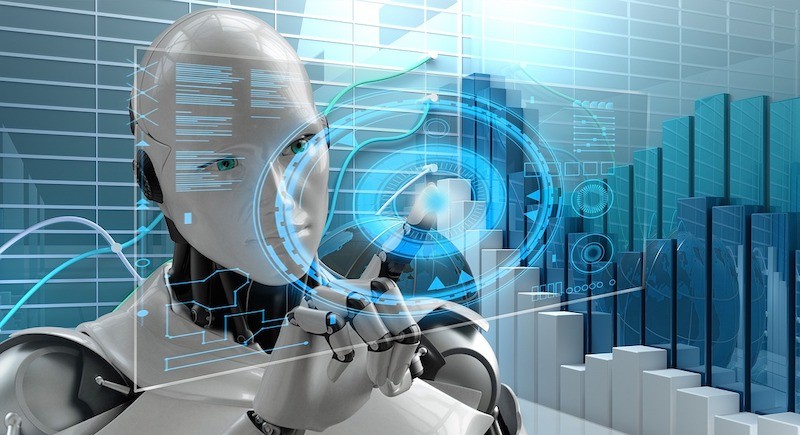Artificial Intelligence (AI) is one of the most exciting and rapidly developing technologies of the 21st century. From self-driving cars to smart personal assistants, AI is already transforming many industries and daily life. As we look to the future, AI promises even greater advancements, but it also brings with it new challenges. This article will explore the opportunities and challenges presented by the future of AI.
What is Artificial Intelligence?
At its core, Artificial Intelligence refers to the development of computer systems that can perform tasks that would typically require human intelligence. These tasks include learning, problem-solving, decision-making, and language understanding. AI systems can process large amounts of data and use algorithms to improve their performance over time. This makes them increasingly valuable across various sectors, from healthcare to finance.
The Growing Impact of AI on Industries
AI’s impact on industries is undeniable. The future of Artificial Intelligence holds the potential to revolutionize key sectors. Let’s take a closer look at some of these industries:
Healthcare
AI is poised to make healthcare more efficient and personalized. Machine learning algorithms can analyze medical data and assist in diagnosing diseases, predicting outcomes, and even creating personalized treatment plans. For instance, AI-driven systems like IBM Watson are already helping doctors make better decisions by processing vast amounts of medical information.
Finance
In the finance industry, AI is used for everything from fraud detection to algorithmic trading. AI systems can analyze financial data at lightning speed, helping banks and financial institutions make more informed decisions. In the future, AI could even assist in managing personal finances through smart applications.
You may also like that : Ztec100.com
Retail and E-Commerce
AI is revolutionizing the way we shop. From personalized recommendations on e-commerce websites to automated customer service agents, AI is improving the shopping experience for consumers. Retailers are using AI to optimize inventory, predict trends, and improve supply chain management.
Transportation
Self-driving cars and autonomous delivery drones are just the beginning of AI’s impact on transportation. In the future, AI will help reduce traffic accidents, improve road safety, and optimize transportation routes, making travel more efficient and environmentally friendly.
Opportunities Created by Artificial Intelligence
The future of Artificial Intelligence holds incredible promise, especially in areas that can improve our daily lives and solve complex global challenges.
Improved Efficiency and Productivity
AI-powered automation can significantly increase efficiency in various sectors. By automating repetitive tasks, AI frees up human workers to focus on more creative and strategic activities. This can lead to greater productivity across industries.
Enhanced Decision-Making
AI systems have the ability to process large volumes of data in real time, providing valuable insights that can improve decision-making. For businesses, this could mean better strategies and improved customer experiences. For governments and organizations, AI could lead to better policies and more effective responses to global challenges.
AI in Education
AI can personalize learning experiences by analyzing a student’s progress and adapting lessons to meet their needs. This technology can make education more accessible, especially in underserved communities. AI-driven platforms could also assist teachers in grading and developing personalized learning materials.
Addressing Global Issues
AI has the potential to help solve some of the world’s most pressing issues, such as climate change and hunger. AI can optimize energy consumption, improve food production, and contribute to scientific research, accelerating progress in finding solutions to these challenges.
Challenges in the Future of AI
While the opportunities for AI are vast, there are also significant challenges that need to be addressed. These challenges must be carefully considered to ensure the responsible development and use of AI technology.
Ethical Concerns
One of the biggest challenges is ensuring that AI systems are used ethically. For example, there are concerns about AI’s role in surveillance, data privacy, and bias. AI algorithms can sometimes reflect the biases present in the data they are trained on, leading to unfair or discriminatory outcomes. It’s crucial that AI developers work to mitigate these biases and ensure that AI benefits everyone equally.
Job Displacement
As AI continues to automate more tasks, there are concerns about job displacement. While AI can increase productivity, it may also result in job losses, particularly in industries where tasks are highly repetitive or manual. Ensuring that workers are retrained for new roles is a significant challenge as AI becomes more widespread.
Security Risks
AI systems are vulnerable to hacking and cyberattacks, which could have serious consequences. For instance, autonomous vehicles and critical infrastructure systems could be targeted by malicious actors. Ensuring that AI systems are secure and resistant to manipulation is vital as the technology becomes more integrated into society.
Lack of Regulation
The rapid development of AI has outpaced the creation of regulations to govern its use. There is currently no global framework for AI governance, leading to concerns about how AI is being used in different countries and industries. Establishing clear and consistent regulations is necessary to prevent misuse and protect individuals’ rights.
The Future of AI: A Balanced Approach
As we look to the future, it’s clear that Artificial Intelligence holds immense potential. However, the challenges associated with its development and use must not be overlooked. To maximize the opportunities and minimize the risks, a balanced approach is needed. This involves creating ethical guidelines, ensuring the security of AI systems, and providing retraining opportunities for workers affected by automation.
Conclusion
The future of Artificial Intelligence presents both remarkable opportunities and complex challenges. From improving healthcare and education to solving global issues, AI can make a significant positive impact on society. However, ethical concerns, job displacement, security risks, and regulation must be addressed to ensure that AI is developed responsibly and benefits all of humanity. As we continue to explore the potential of AI, companies like Magque are working to integrate AI technologies in innovative ways that balance progress with responsibility. It is essential that we strike the right balance between innovation and regulation.
